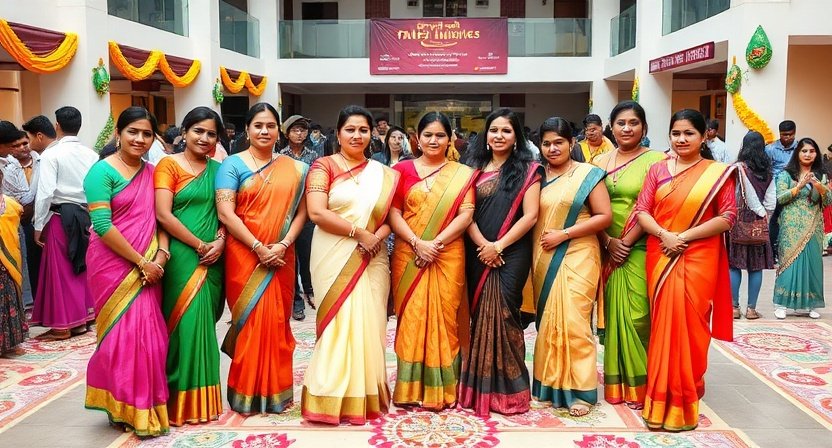Tamil Students Associations (TSAs) serve as vital cultural and academic hubs within educational institutions worldwide, fostering community among Tamil-speaking students while preserving and promoting Tamil heritage. These organizations have become instrumental in creating inclusive spaces where students can connect with their roots, support one another academically, and celebrate their rich cultural traditions.
Table of Contents
The Origins and Evolution of Tamil Students Associations
Tamil Students Associations emerged from the need for cultural representation and community support within diverse educational environments. As Tamil students began pursuing higher education in various countries, particularly in institutions where they formed minority groups, the necessity for organized cultural and social support became apparent.
These associations typically began as informal gatherings of Tamil-speaking students who shared common linguistic and cultural backgrounds. Over time, they evolved into formally recognized student organizations with structured leadership, defined missions, and comprehensive programming that serves both Tamil students and the broader campus community.
The growth of TSAs reflects the global Tamil diaspora’s commitment to maintaining cultural connections while embracing educational opportunities worldwide. From small study groups to large-scale organizations hosting hundreds of members, these associations have adapted to meet the changing needs of Tamil students in contemporary educational settings.
Core Objectives and Mission of Tamil Students Associations
Cultural Preservation and Promotion
Tamil Students Associations primarily focus on preserving and promoting Tamil culture, language, and traditions within academic institutions. This mission encompasses organizing cultural events, language workshops, and traditional celebrations that introduce Tamil heritage to diverse campus communities while providing familiar cultural touchstones for Tamil students.
Academic Support and Networking
These organizations provide crucial academic support through peer mentoring programs, study groups, and professional development initiatives. Members benefit from shared academic experiences, career guidance, and networking opportunities that extend beyond their college years into professional careers.
Community Building and Social Integration
TSAs create welcoming environments where Tamil students can form meaningful friendships and support networks. These connections often prove invaluable for students navigating cultural adjustments, academic challenges, and social integration in new educational environments.
Organizational Structure and Leadership
Most Tamil Students Associations operate with democratic governance structures that encourage student participation and leadership development. Executive committees typically include positions such as President, Vice President, Secretary, Treasurer, and various coordinators responsible for specific activities like cultural events, academic programs, and community outreach.
Leadership roles within TSAs provide valuable experience in organizational management, event planning, financial oversight, and community engagement. Many students who serve in these capacities develop skills that enhance their professional careers and continue their community involvement after graduation.
The democratic nature of these organizations ensures that programming reflects the diverse interests and needs of Tamil student populations, from recent immigrants maintaining strong cultural ties to second-generation students exploring their heritage.
Key Activities and Programs
Cultural Celebrations and Festivals
Tamil Students Associations organize elaborate celebrations of significant Tamil festivals such as Tamil New Year (Puthandu), Deepavali, and Pongal. These events typically feature traditional music, dance performances, authentic cuisine, and cultural displays that educate the broader campus community about Tamil traditions.
Language and Literature Programs
Many TSAs conduct Tamil language classes for students interested in learning or improving their proficiency. These programs often include literature discussions, poetry recitations, and workshops exploring classical and contemporary Tamil works.
Academic and Professional Development
Professional development workshops, guest lectures by Tamil professionals, and academic support programs form crucial components of TSA programming. These initiatives help students navigate career paths, develop professional skills, and connect with Tamil alumni networks.
Community Service and Outreach
Tamil Students Associations frequently engage in community service projects, both within their immediate campus communities and in support of Tamil communities globally. These initiatives demonstrate the organizations’ commitment to social responsibility and community engagement.
Impact on Student Experience and Development
Cultural Identity and Belonging
For many Tamil students, particularly those studying far from home, TSAs provide essential connections to cultural identity and heritage. These organizations help students maintain linguistic skills, understand cultural traditions, and develop pride in their Tamil identity while adapting to new educational environments.
Leadership and Personal Growth
Participation in Tamil Students Associations offers numerous opportunities for personal and leadership development. Students gain experience in event planning, public speaking, financial management, and community organizing that enhances their overall educational experience.
Cross-Cultural Exchange
TSAs serve as bridges between Tamil culture and broader campus communities, facilitating meaningful cultural exchange through educational programs, festivals, and collaborative initiatives with other student organizations.
Challenges and Opportunities
Membership Engagement and Retention
Maintaining consistent membership engagement presents ongoing challenges for many TSAs, particularly as student populations fluctuate and academic demands intensify. Successful organizations continuously adapt their programming to meet evolving student interests and needs.
Funding and Resource Management
Like many student organizations, TSAs often face financial constraints that limit programming scope and impact. Creative fundraising strategies and partnerships with academic departments and community organizations help address these challenges.
Intergenerational Perspectives
Balancing traditional cultural elements with contemporary interests requires thoughtful programming that appeals to students with varying levels of cultural connection and diverse backgrounds within the Tamil community.
The Global Network of Tamil Student Organizations
Tamil Students Associations exist across numerous countries and continents, creating informal networks that facilitate collaboration and resource sharing. Students often maintain connections with TSAs at different institutions, creating lasting professional and personal networks that span geographical boundaries.
International conferences and cultural festivals sometimes bring together Tamil student organizations from various institutions, fostering broader community connections and sharing successful programming strategies.
Future Directions and Evolution
As Tamil student populations continue to grow and diversify, Tamil Students Associations are evolving to meet changing needs and interests. Digital platforms and virtual programming have expanded reach and accessibility, particularly following global shifts toward online education and community building.
Future developments may include enhanced alumni engagement, expanded professional mentoring programs, and increased collaboration with Tamil cultural organizations and businesses to create comprehensive support networks for Tamil students.
Frequently Asked Questions (FAQs)
What is a Tamil Students Association?
A Tamil Students Association is a student organization within educational institutions that serves Tamil-speaking students by providing cultural programming, academic support, and community building opportunities while promoting Tamil language and heritage.
Who can join a Tamil Students Association?
Membership policies vary by institution, but most TSAs welcome students with Tamil heritage, those interested in Tamil culture and language, and sometimes extend membership to anyone interested in supporting the organization’s mission.
What types of events do Tamil Students Associations organize?
TSAs typically organize cultural festivals, language workshops, academic support programs, professional development seminars, community service projects, and social events that bring together Tamil students and educate the broader campus community.
How can someone start a Tamil Students Association at their school?
Starting a TSA usually requires following the institution’s process for establishing student organizations, which typically involves gathering interested students, drafting a constitution, securing faculty advisors, and submitting formal recognition applications.
Do Tamil Students Associations only serve students from Tamil Nadu?
No, TSAs typically serve all Tamil-speaking students regardless of their specific regional origins, including those from Tamil Nadu, Sri Lanka, Singapore, Malaysia, and other regions with Tamil populations.
What benefits do members receive from joining a Tamil Students Association?
Members benefit from cultural connection, academic support, networking opportunities, leadership development, social community, and access to events and programs that celebrate and promote Tamil heritage.
How do Tamil Students Associations contribute to campus diversity?
TSAs enhance campus diversity by organizing cultural educational events, facilitating cross-cultural dialogue, and creating inclusive spaces that celebrate Tamil heritage while building bridges with other campus communities.

